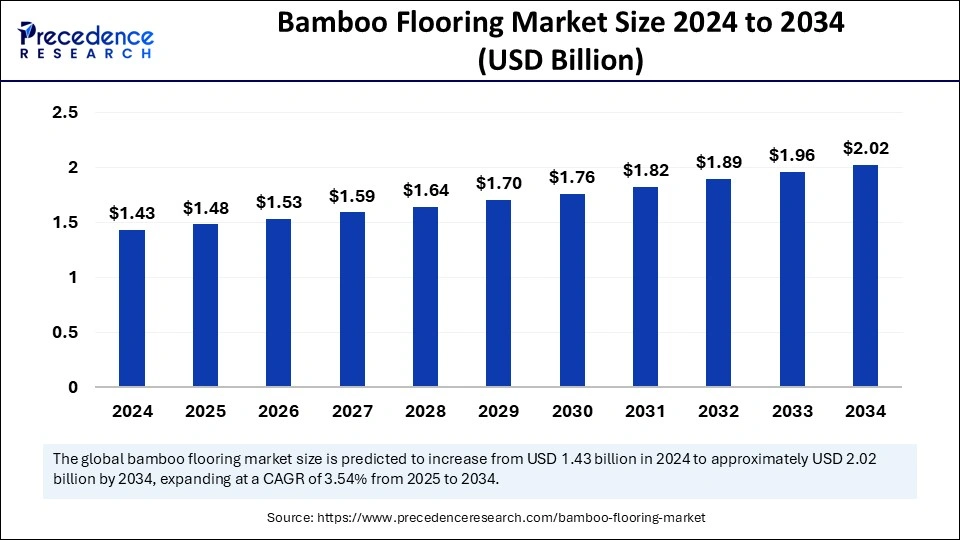 Bamboo Flooring Market Key Takeaways
Bamboo Flooring Market Key Takeaways- Asia Pacific dominated the global market with the largest market share of 41% in 2024.
- North America is expected to grow at the fastest CAGR over the period studied.
- By type, the solid bamboo floor segment held the largest market share in 2024.
- By type, the engineered bamboo floor segment is expected to grow at the fastest CAGR over the forecast period.
- By application, the residential sector segment has held the largest market share in 2024.
- By application, the commercial sector segment is anticipated to grow at the fastest rate over the projected period.
Market Overview
The bamboo flooring market is emerging as a significant segment within the sustainable construction industry. Consumers are increasingly seeking environmentally responsible materials that do not compromise on durability or style, and bamboo meets these criteria effectively.
The bamboo flooring market spans multiple end-user categories, including residential homeowners, commercial property developers, and institutional builders. Technological advancements have enabled manufacturers to produce bamboo flooring in a variety of colors, grains, and finishes, expanding its appeal across a diverse customer base.
Drivers
A strong driver of the bamboo flooring market is the increasing pressure on the construction sector to reduce its carbon footprint. Bamboo grows much faster than traditional hardwood trees and absorbs more carbon dioxide, making it an ideal material for green buildings.
The rising incidence of respiratory illnesses has led to a preference for low-emission building materials, further boosting demand for bamboo flooring. Additionally, the competitive pricing of bamboo compared to hardwood enhances its attractiveness among budget-conscious consumers and developers alike.
Opportunities
There are ample opportunities for growth in the bamboo flooring market through strategic expansion into underdeveloped regions. Government incentives for green construction and tax rebates for eco-friendly renovations are creating favorable conditions.
Another key opportunity lies in product customization—offering consumers the option to select plank size, finish, and installation method. The rise in home improvement projects, particularly in the wake of remote working trends, has also created a renewed interest in aesthetically pleasing and eco-friendly flooring solutions such as bamboo.
Challenges
However, the bamboo flooring market is not without its challenges. One significant concern is the lack of standardized quality control, which affects customer satisfaction and repeat purchases. Differences in manufacturing processes can lead to products with varying moisture resistance and hardness levels.
The market also faces logistical issues due to the bulkiness of flooring materials, complicating distribution and increasing shipping costs. Consumer misconceptions about bamboo’s strength compared to traditional hardwood may also act as a barrier, requiring ongoing education and marketing efforts.
Regional Insights
The Asia-Pacific region leads the bamboo flooring market, not only because of its natural bamboo reserves but also due to favorable governmental policies supporting sustainable industries. North America follows closely, especially the United States and Canada, where green certification requirements are strict and consumer awareness is high.
Europe’s demand for eco-friendly construction materials is driving steady growth, particularly in countries like Germany and the Netherlands. Africa and parts of South America represent emerging frontiers, where infrastructure development is opening doors for sustainable building solutions.
Recent Developments
Innovation is shaping the trajectory of the bamboo flooring market, with many companies investing in new treatment technologies that improve water resistance and longevity. Recent developments include hybrid bamboo-ceramic composites that cater to high-traffic commercial environments. Brands are increasingly using digital marketing and virtual showroom experiences to showcase their flooring lines, improving consumer engagement.
Additionally, manufacturers are enhancing transparency around their sourcing and sustainability practices to attract environmentally conscious buyers, often leveraging third-party certifications to validate their claims.
Bamboo Flooring Market Companies
- Yoyu
- Dasso
- Jiangxi Feiyu
- Eco Bamboo and Wood
- Tengda
- Jiangxi Shanyou
- Sinohcon
- Tianzhen
- Kang Ti Long
- Huayu
- Kangda
- Kanger Group
- Zhutao
- Jiangxi Lvbao
- US Floors Inc
- Teragren
- Bamboo Hardwoods
Segments Covered in the Report
By Type
- Engineered Bamboo
- Stranded Bamboo
- Solid Bamboo
- Sustainable Bamboo
By Application
- Residential
- Commercial
- Industrial
- Outdoor
By Region
- North America
- Europe
- Asia Pacific
- Latin America
- Middle East and Africa